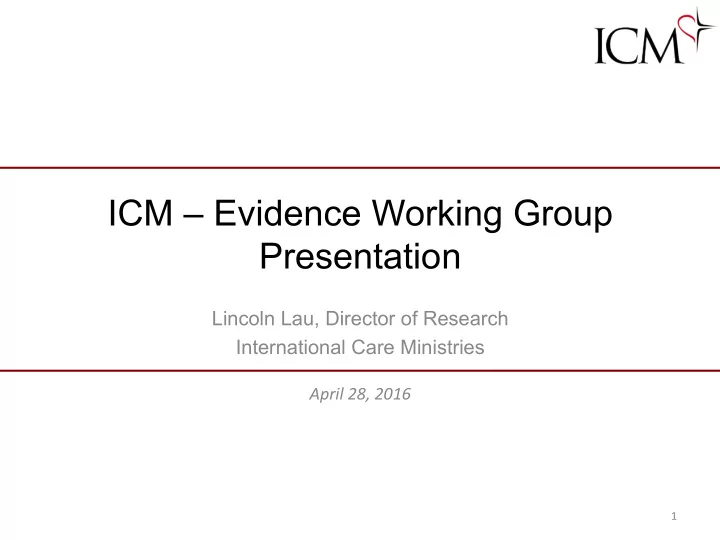

ICM – Evidence Working Group Presentation Lincoln Lau, Director of Research International Care Ministries ¡ April ¡28, ¡2016 ¡ 1 ¡
International Care Ministries (ICM) • Non-profit organization based in the Philippines • Vision: "To release families living in ultrapoverty from physical, emotional, and spiritual bondage" • Core program: 16-week community-based intervention called Transform that targets households living in ultrapoverty (i.e. living on < $0.50 USD per person per day) • Program consists of lessons in three broad themes A. Values B. Health C. Livelihood 2 ¡
VISION Ultrapoor families released from physical, emotional and spiritual bondage through healthy churches High student enrollment in IMPACT IMPACT public school, improved Improved hope, social capital, spiritual satisfaction & journey, household health, nutrition, sanitation and water student performance in treatment. Increased household income & savings. public school, all Transform impact for parents Increased kindergarten Increased gardens, increased RESULTS attendance & graduation, Improved hope, improved self- Improved health, improved RESULTS vermiculture, increased BiB image, improved relationships, nutrition, improved household improved students health,, dispersal & repayment, Transform results parents, improved spiritual satisfaction, sanitation, improved water increased SG membership, improved spiritual journey treatment increased parent attendance savings & loans to Parents Education course Cases screened, TB cases Personal & community garden, INDICATORS INDICATORS Kindergarten attendance & Self-image, family and referred, pregnant mothers personal & community graduation, students health, community relationships, referred, malnutrition cases fully vermiculture, BiB dispersal & all Transform indicators for spiritual satisfaction, spiritual treated, access to medical care, repayment, savings group parents, parents attendance journey access to purified water, access membership, total savings & to Parents Education course to toilets total loans Health training, Livelihood training on financial Teaching DepEd ACTIVITIES ACTIVITIES health & disease screening, literacy, small business skills & kindergarten curriculum, Facilitating Biblically based TB referral, malnutrition savings groups, business-in-a- teaching values, students worldview, small groups, home treatment, pregnancy box microloans, organic health checks, M-F feeding, visits management & referral, SMC gardening, savings group Transform & Parent referral meetings Education course ASSUMPTIONS Values Health Livelihood ASSUMPTIONS Students lack access, Social capital is the greatest Society is familiar with God, but Ultrapoor lack access, RHU’s parents value work above resource, lowering the barriers doesn’t understand grace lack resources education, to success will achieve success TRANSFORM JUMPSTART THRIVE CHURCH NETWORK Ultrapoor families live in a cycle of poverty that they feel trapped in PROBLEM
Data at ICM • Our aim is to be a data-driven organization • Data is broadly categorized into: 1) Monitoring, 2) Evaluation, & 3) Learning Monitoring • Participant attendance, dropout, graduation, recovery, savings, etc. • Distribution of food, medicines, materials, etc. Evaluation • All participants are screened for poverty prior to the start of the program (propensity scoring) • Households are surveyed before and after Transform • Survey covers a variety of topics (e.g. social capital, income, savings, hygiene practices, food security, etc.) • A subset are surveyed 6, 12, 24 & 36 months post-intervention • Over 200,000 surveys have been administered by ICM in the last 4 years 4 ¡
Data at ICM Learning • Studies designed to address specific gaps in knowledge and research needs • Examples: • How does the education level of our trainers affect program effectiveness? • The relationship between baseline social capital in households and success of child feeding • Values taught informally vs Values taught formally, a randomized controlled trial The Role of the Research Department • In addition to organizing research projects (internally and with partners), to assist operations and individual departments (Values, Health, Livelihood, Education) in integrating data and research in the management of activities • Specifically, the design of 'Evaluation Frameworks' 5 ¡
DESIGN ¡EVALUATION ¡FRAMEWORK/SURVEYS ¡ DATA ¡COLLECTION ¡& ¡ QUALITY ¡ Edith ¡ Values ¡ Daniel/Peter ¡ Research ¡ Metrics ¡ Database ¡ Transform ¡ Hector ¡ Collaborate ¡to ¡ Organize, ¡hire ¡and ¡ (Project ¡Tmr, ¡ Health ¡ finalize ¡ schedule: ¡1) ¡ Nate’s ¡db, ¡ Prevail ¡ ques6onnaire ¡and ¡ Enumera6on ¡& ¡2) ¡ Dropbox, ¡Google ¡ Michael ¡ methods ¡ Encoding ¡ Drive, ¡etc.) ¡ Livelihood ¡ Jojo ¡ ACCESS ¡& ¡DATA ¡SYSTEMS ¡ Thrive ¡ Anna/Jackie ¡ Jumpstart ¡ Monitoring ¡ Reports ¡ Research ¡ Lincoln ¡ Pre/Post ¡ Survey ¡ Managing ¡ Analysis ¡ EOYR/EOB ¡ programs ¡ Strat ¡1/2/3 ¡ ¡ Other ¡ ¡ Studies ¡ Program ¡ Design ¡ 6 ¡
Randomized Controlled Trials (RCT) at ICM • Main study in partnership with Innovations in Poverty Action (IPA) • Internal RCTs were also conducted to pilot the logistics, and collect data Purpose: To produce high quality evidence around program outcomes Religious Variables/Indices • The faith-based element of ICM's Transform program is also being studied as one of the outcomes. These are grouped into a number of indices: 1. Intrinsic Religion 2. Extrinsic Religion 3. General Religion 4. Religious Knowledge • Other indices potentially relevant to faith-based organizations: • Life satisfaction (Kessler psychological scale), Trust, Community Activities, Powerful Others, Locus of Control, Life Orientation, Optimism, Grit, Self-Control 7 ¡
Lessons Learnt & Challenges • As a data (indicator) driven organization, how do we factor in spiritual/ faith-based elements that all stakeholders can agree upon? • Need to start somewhere – collect data (lots of piloting is ok) • Use list randomization for sensitive questions • Analysis. We observe change in many variables and indices, however identifying the causal pathways of these changes is a challenge • Creativity . It has been necessary to be creative in study design and methods to implement studies which isolate specific interests as a faith- based organization without being contextually inappropriate 8 ¡
9 ¡
Recommend
More recommend